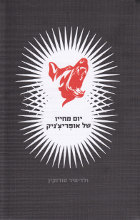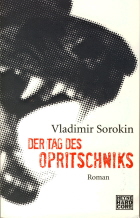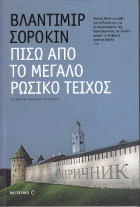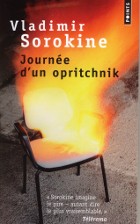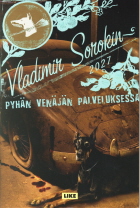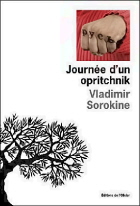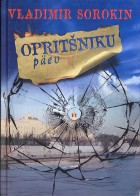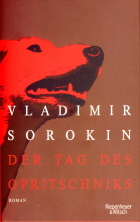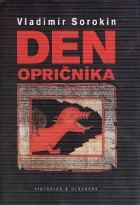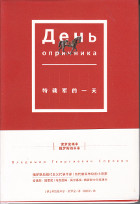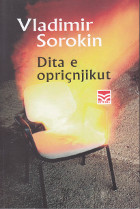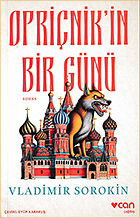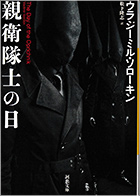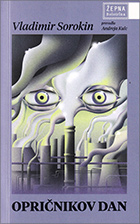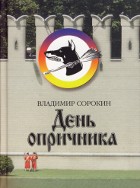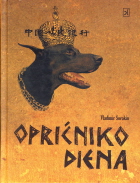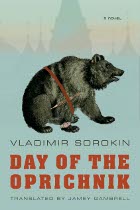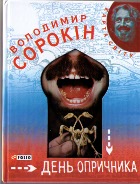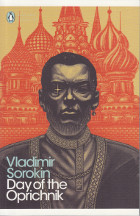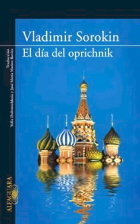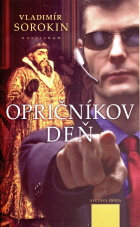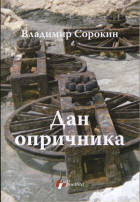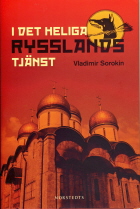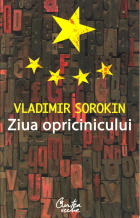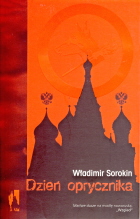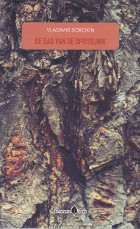Vladimir Sorokin
A Day in the Life of an Oprichnik
Proposal
Published by
- Sakharov Publishers, Russia
- Kiepenheuer & Witsch, Germany
- Éditions de l’Olivier, France
- Norstedts, Sweden
- Alfaguara, Spain
- A.B., Poland
- Gondolat Kiadó, Hungary
- Kitos knygos, Lithuania
- Kalligram, Slovakia
- Curtea Veche, Romania
- Like Publishing, Finland
- Argo Publishers, Estonia
- Flamme Forlag, Norway
- Pistorius & Olsanska, Czech Republic
- Kinneret-Zmora, Israel
- Forlaget Vandkunsten, Denmark
- Geopoetika Publishing, Serbia
- Folio, Ukraine
- Farrar, Strauss and Giroux, USA
- Metaichmio, Athens
- Atmosphere libri, Italy
- Shanghai Translation, China
- Kawade Shobo Shinsha, Japan
- Ilia State University Press, Georagia
- Editora 34, Brazil
- Stichting Uitgeverij Douane, The Netherlands
- Metaichmio, Greece
- Dituria, Albania
- Penguin Classics, London
- Can Publishing, Turkey
Russia in the year 2027. The period of the Red, White and Grey turmoil, followed by the period of the restoration are over. It is now that time to put the rebirth of Russia on the agenda. The monarchy has taken power, and has officially declared that its guiding principles are: self-determination, Orthodoxy and tradition. It has already been a long time since foreign travel passports had been burned on Red Square and all the foreign diplomats were expelled. The country has been encircled by “The Great Wall of Russia,” and cut off from the rest of the world. The quality of life is only sustained by the export of oil and gas, and the only nation with whom there are friendly relations is China, which is the source of all the goods needed for private and industrial consumption, from Boeing aircraft to toilet bowls.
Sorokin’s literary experiment shows the reader a Russia, doomed to sink into the past, in a return to the dark ages, in which the Oprichnik-s of Ivan the Terrible held sway. (Ivan had set up the Oprichnik-s in 1565 to serve as his bodyguard. They developed into a sort of “high-priest” class that knew neither rule nor law, creating a unholy state within a state.) Sorokin is the first Russian writer to make contemporary use of this dark and sensitive era, a pathological episode in Russian history that, in Sorokin’s opinion, found a fertile field to grow on in Russia. “I think that all our ‘troubled times,’ revolutions, disturbances, and the sea of blood that has been shed in Russia are the result of the rule of the Oprichnik-s. This idea permeates the whole of our society, it lives in the minds of bureaucrats both large and small. The Oprichnik-s are the chosen ones.
In the Moscow of 2027, the “servants of the Tsar” ride around in red Mercedes limousines—made in China, of course—with dogs’ heads on their bumpers and brooms on their trunks. Just as in the time of Ivan the Terrible, these symbols signify that treason will be eradicated and swept from the face of the Russian soil. The novel describes a normal workday for a member of this corruptly brutal elite. He is the narrator, Andrej Komyaga.
It is a Monday, which like every other day, begins with Komyaga nursing a hefty hangover. After a vodka with sauerkraut juice and a dip in the whirlpool, Komyaga gets ready for work. An unpopular Boyar, one of the new-Russian nobility, is scheduled to be hanged from the main gate of his estate, and his wife—as per usual—raped, and his house burned to the ground. After attending church services at the Uspenski cathedral, Komyaga oversees the dress rehearsal for a celebratory concert in the Kremlin. In Orenburg in the Urals, he will have to take the customs officers to task. They are siphoning off a part of the profits that the Oprichnik-s make from the multi-leveled superhighway across which flows trade between China and Europe.
Thereafter, on the orders of the Tsarina who is addicted to love, he flies to Tobolsk to visit a seer, who will cast a spell on a young man. Having returned to Moscow, he goes to the square in front of the University of Moscow to witness the flogging of some intellectuals. He then goes to a concert given by a bard who sings songs about the licentious life of the Tsarina, to the accompaniment of a saw. Finally he reports to the Tsarina, who has just gotten up. After having had breakfast with her, he goes to dinner with his comrades, who not only take the time to royally enjoy the meal, and to relax in the sauna, but also to eliminate the Tsarina’s son-in-law who has fallen into disfavor, and have a few snorts of coke. Daybreak sees the unconscious Komyaga being carried home.
Within the narrow confines of the novel Sorokin presents the reader with a grandiose diorama of Russia. He mixes the 16th century with the 18th, and the Soviet period with the realities of the present day. Asiatic despotism, corruption and cynicism fit hand in glove with modern technology and Russian statehood. The Tsarina who is addicted to love has the traits of Catherine the Great. The seer lives in Tobolsk, just like Rasputin. In Sorokin’s tale, good citizens—just as in Stalin’s time—bring their written denunciations to the Lubyanka, in front of which is a statue of Maluta Skuratov, the leader of the Oprichnik-s. This is the spot occupied by a statue of Feliks Dzerzhinski, the founder of the Ch.K. (the forerunner of the NKVD and KGB) during the Soviet period. Lampoons of the Tsarist family are circulating on the Internet, and Russian professors are completing their decoding of the aging gene. In pharmacies “light” drugs like cocaine are sold to help the Russian citizens at work and in recuperation. There are 28 million Chinese living in Siberia, and even the children of the Tsar prefer to speak Chinese amongst themselves. Pipelines for oil and gas exit Russia in all directions, and occasionally when the tap is turned off, the people in Western Europe or Japan lose their heating.
After his post-Soviet travesties, Sorokin now presents the reader with a very “Russian” novel that not only explores possible future tendencies, but also seems to be missing a clearly identifiable Russia, as it stretches between the past and the future, exploring a proclivity towards isolationism and a yearning for barbarianism, that seems somehow to be part of the make-up of Russian metaphysics. For this novel about the return to the Middle Ages, Sorokin has developed a style of speech that seems to come right out of the 16th century, but which, at the same time, seems to effortlessly integrate neologisms for the realities of the modern day.
“Vladimir Sorokin is one of Russia’s greatest writers, and this novel is one of his best. Day of the Oprichnik is a haunting and terrifying vision of modern Russia projected two decades into the future–or maybe not the future at all. A joy to read–more entertaining, dynamic, engaging, and deeply hilarious than a dystopian novel has any right to be.” ?Gary Shteyngart, author of Absurdistan and Super Sad True Love Story
“Anyone who wants to learn more about Russia and what could be the outcome of [Vladimir] Putin’s rule should read the book. It’s dark and dystopian, but it’s a part of our life.” ?Garry Kasparov, Time
“Might this be something of a Sorokin moment in the Anglophone world? Is the pope German?” ?Stephen Kotkin, The New York Times Book Review
“[A] take-no-prisoners satire from one of Russia’s literary stars . . . Vladimir Sorokin’s lurid, wildly inventive Day of the Oprichnik is a rowdy critique of Russia’s drift toward authoritarianism.” ?Taylor Antrim, Newsweek
“Sorokin’s book is a sleek and darting fish . . . Day of the Oprichnik . . . should attract the readership [Sorokin] deserves . . . He has a fearless imagination willing to be put to most grotesque and energetic use.” ?Alexander Nazaryan, The New Republic
“Compelling . . . Devastating . . . Powerful . . . In Day of the Oprichnik, [Sorokin] combines futurological invention with political archaism to vicious satirical effect . . . It’s as if hi-tech limbs had been grafted onto the torso of early modern statecraft: Wolf Hall meets William Gibson.” ?Tony Wood, London Review of Books
“Day of the Oprichnik is Vladimir Sorokin’s funniest and most accessible book since The Queue. The KGB orgy scene at the end is worthy of the great shit-eating scenes of his earlier work.” ?Keith Gessen, author of All the Sad Young Literary Men
“Sorokin’s novel packs a hefty satirical punch that will show American audiences why the author has been so controversial in Russia . . . Great fun, with a wickedly absurdist humor that occasionally reminds one of William S. Burroughs.” ?Booklist
“Perhaps no other postmodern writer demonstrates the angst around the reemergence of Russia’s slide back toward authoritarianism than the celebrated (and often reviled) satirist Sorokin. His latest assault, not only on Putin’s government but literary senses, is a caustic, slash-and-burn portrait of a man joyfully engaged in the business of state-initiated terrorism . . . It’s disturbing stuff, but as Sorokin’s razor-sharp caricature unfolds . . . the novelist’s keen argument becomes hard to ignore . . . [An] acidly funny send-up of Russia’s current state of affairs.” ?Kirkus Reviews
“Sorokin’s creations are at once fantastically strange and all too familiar. His pen drips with imaginative fury . . . [Day of the Oprichnik] holds its own with dystopian classics like Fahrenheit 451 and honors the traditions of Dostoyevsky, Tolstoy, and other great Russian writers even as its characters burn their books.” ?Library Journal
“If queues were arranged in order of merit, it would only be fair to put . . . Vladimir Sorokin at the head.” ?Lucy Ellman, The Guardian
“Sorokin [is] one of Russia’s funniest, smartest and most confounding living writers.” ?Elaine Blair, The Nation
“Controversy chases the Russian writer Vladimir Sorokin the way a dog chases a stick.” ?Ken Kalfus, The New York Times Book Review
“Sorokin’s novel packs a hefty satirical punch that will show American audiences why the author has been so controversial in Russia . . . Great fun, with a wickedly absurdist humor that occasionally reminds one of William S. Burroughs.”
—Booklist
“Perhaps no other postmodern writer demonstrates the angst around the reemergence of Russia’s slide back toward authoritarianism than the celebrated (and often reviled) satirist Sorokin. His latest assault, not only on Putin’s government but literary senses, is a caustic, slash-and-burn portrait of a man joyfully engaged in the business of state-initiated terrorism . . . It’s disturbing stuff, but as Sorokin’s razor-sharp caricature unfolds . . . the novelist’s keen argument becomes hard to ignore . . . [An] acidly funny send-up of Russia’s current state of affairs.”
—Kirkus Reviews
“Sorokin’s creations are at once fantastically strange and all too familiar. His pen drips with imaginative fury . . . [Day of the Oprichnik] holds its own with dystopian classics like Fahrenheit 451 and honors the traditions of Dostoyevsky, Tolstoy, and other great Russian writers even as its characters burn their books.”
—Library Journal

